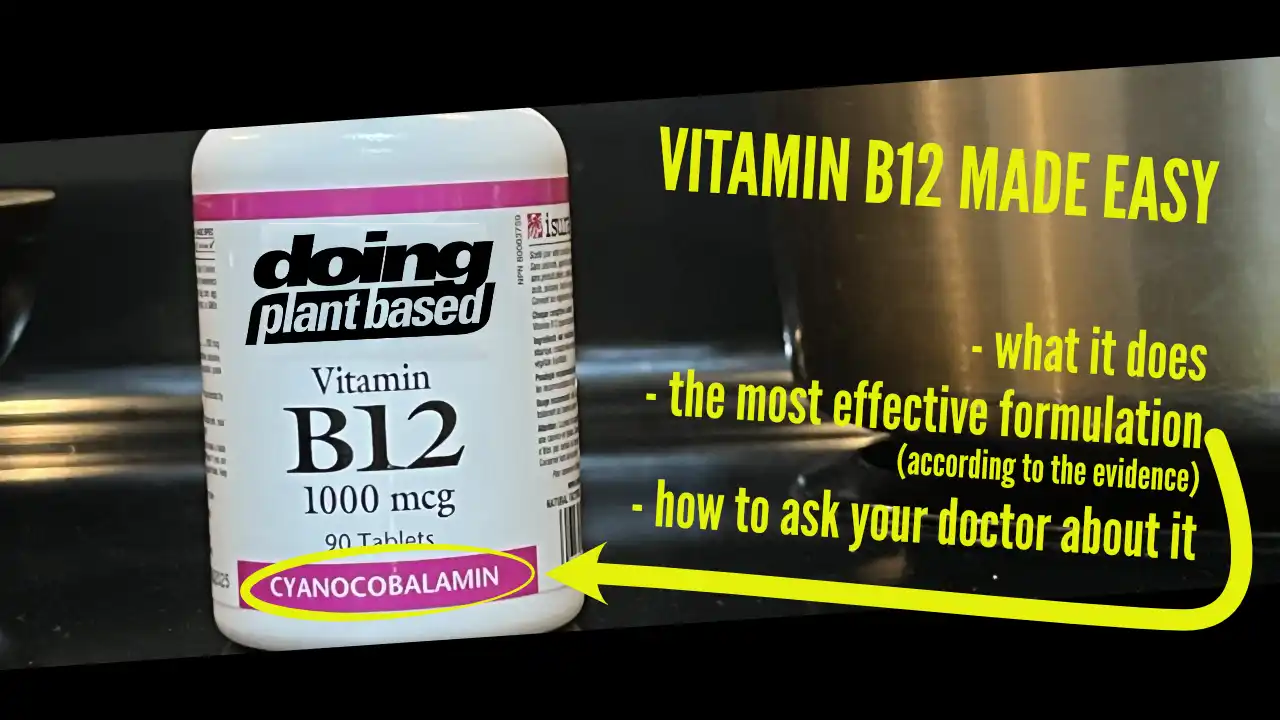Back when I was a proper omnivore and encountered a vegan, I'd do the annoying (to them) thing and ask about their protein intake. Nowadays the curious omnivores put the question to me, but a few years into the plant-based thing I'm a little surprised that no one has asked about where we get our B12 from.
Unlike protein-deficiencies affecting an imaginary number of people every year, B12 deficiency affects enough people that there's empirical data: 6 percent of people under the age of 60 in the UK and USA were found to be deficient; in Canada, between 2009 and 2011, about 4% of all adults were not meeting the RDI.
This is probably a major problem for these people; B12 plays a role in forming things like red blood cells, the protective sheath around nerve fibers and even DNA, and is part of the process that converts proteins, fats and carbs into useable energy. While our bodies do store a supply in our livers, we can't produce any of it, and the bacteria in our gut that does produce it is too far down the colon to be utilized.
Anything created in the lower bowel is too low in the digestive tract to be absorbed, so the vitamin is passed in the feces
becoming vegan
by BRENDA DAVIS, RD & VESANTO MELINA, MS, RD
So unless we eventually want to suffer from pernicious anemia, paraesthesia, and even death, we have to supplement. Fortunately, it's inexpensive, and it's use is supported by evidence, especially in those of us doing plant-based.
BUT... a few months back I received an email from one of the lists I'm on, explaining that there's probably a superior formulation of B12, and when I checked the bottle, I wasn't taking it. According to Dr. Greger:
Cyanocobalamin “is the most used form due to its high stability.”
See, “methylcobalamin is less stable than cyanocobalamin,
and it is particularly susceptible to photodecomposition,”
meaning destruction from being exposed to light.
nutritionfacts.org
DR. MICHAEL GREGER
Jessica likes to buy our supplements at a local place, and when I tagged along with her to get some cyanocobalamin B12, it took a little bit of effort—the store had all sorts of the methyl forms (some of which were really expensive) in fancy-looking transparent bottles, all merchandised in a brightly lit store. This was a while back now, but I seem to recall the place only had a couple of bottles of what I was looking for (both in opaque containers).
How Much To Take?
We want to achieve a value of 160 to 950 picograms per milliliter.
...
That means nothing to me, so I checked Dr. Greger's site and a few others and a few others and most recommendations are in the 2000 to 2500 mcg per week range. I like to keep things simple and take 1000 mcg every three days. I have a recurring alert set in my task list that's pops up every few days, so I never forget.
Before we go any further...
Obviously you don't want to take the word of a couple who runs a blog as medical advice. We're both experienced trainers in our dayjobs unrelated to eating, and have been successful in the past modifying our own behaviours around food, but you're going to want to consult with your doctor.
Now, don't go telling them that we're suggesting B12 supplements; tell them that you were referred to websites like:
- Dietary Reference Intakes - Canada.ca
- Vitamin B12 - Health Professional Fact Sheet
- Vitamins and minerals - B vitamins and folic acid - NHS
You could also show them this Vitamin B12 recommendations infographic, or this article about unsubstantiated claims about B12, both of which suggest that people on plant-based diets supplement B12, and explain that you're working on the switch and want to get ahead of this.
I Wish Someone Had Told Me...
This is such an easy thing to get really right, and looking back I should have started supplementing B12 when I decided to take the plant-based thing seriously—the very beginning, when I was still extremely omnivorous. Not one of anyone I ever asked about plant-based or Veganism ever mentioned this to me, so I'm doing it here and now:
B12 in it's cyanocobalamin form is inexpensive, safe, and readily available online.
It's an easy habit to pick up and stick to; I just added it to my daily task list and eat 1000 mcg every three days.
Simple.

